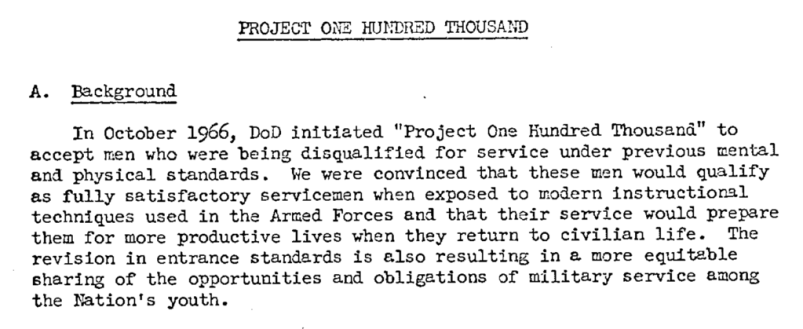Late in 1965—after the Voting Rights Act, after Watts—an evidently frustrated Lyndon Johnson asked, “What do they want—what really do they want?” Shortly afterward Johnson’s administration decided that what African Americans really wanted was to fight in Vietnam. The US Army needed more soldiers than it was taking, because many – especially the poor, among whom black men were overrepresented – failed the Armed Services Qualification Test. With Project 100,000, the Defense Department established “new standards” that would admit to service many American men who would otherwise have been disqualified.
Johnson’s Assistant Secretary of Labor, Daniel Patrick Moynihan, issued the 1965 report The Negro Family: The Case for National Action, which identified broken homes and absent fathers as the central “pathology” of black culture, and suggested that for African Americans
There is another special quality about military service for Negro men: it is an utterly masculine world. Given the strains of the disorganized and matrifocal family life in which so many Negro youth come of age, the Armed Forces are a dramatic and desperately needed change: a world away from women, a world run by strong men of unquestioned authority, where discipline, if harsh, is nonetheless orderly and predictable, and where rewards, if limited, are granted on the basis of performance. The theme of a current Army recruiting message states it as clearly as can be: “In the U.S. Army you get to know what it means to feel like a man.”…
With Project 100,000, a much larger number of African American men got that feeling. As the document indicates, 36.7% of the new recruits were black. More than a third of them were unemployed, and nearly a fifth were earning less than $60 a week. In other words, they were among the poor and less well educated, which was the group of Americans most likely to see combat in Vietnam. As the document indicates, the administration regarded the program as a “success.”
The document comes from the Virtual Archive of Texas Tech University. On Project 100,000 see also Lawrence Baskir and William Strauss, Chance and Circumstance







From the era when it was difficult to distinguish military recruiting strategy from a Village People song.